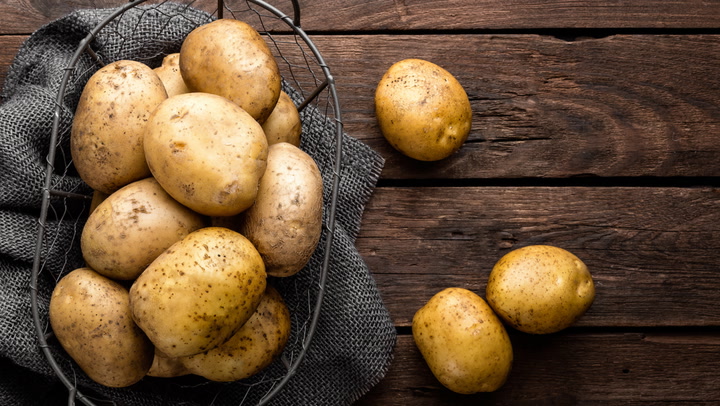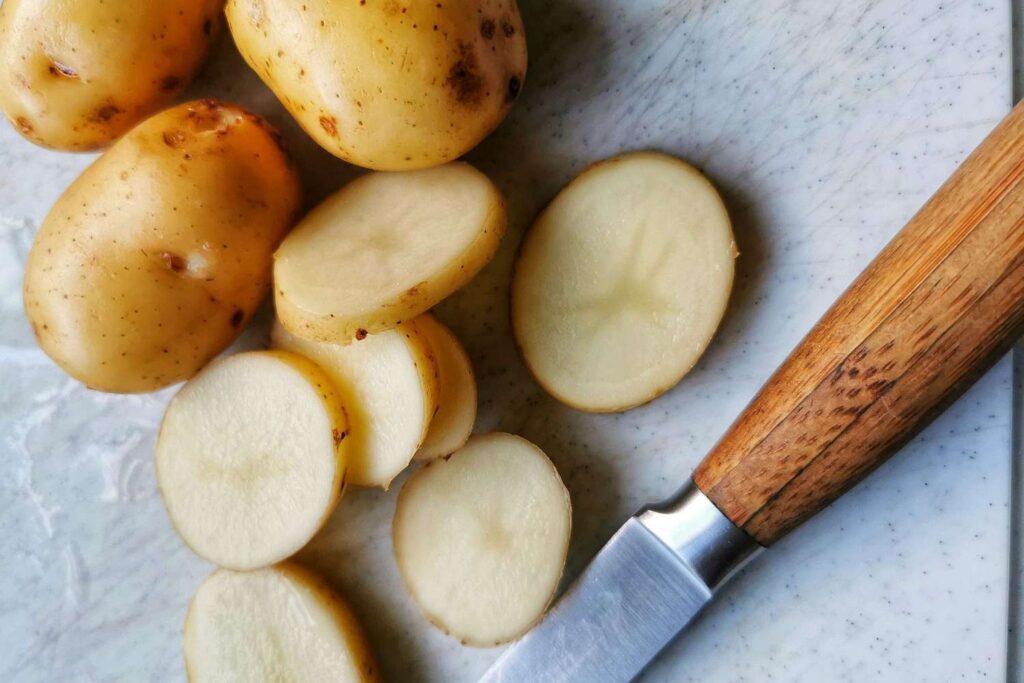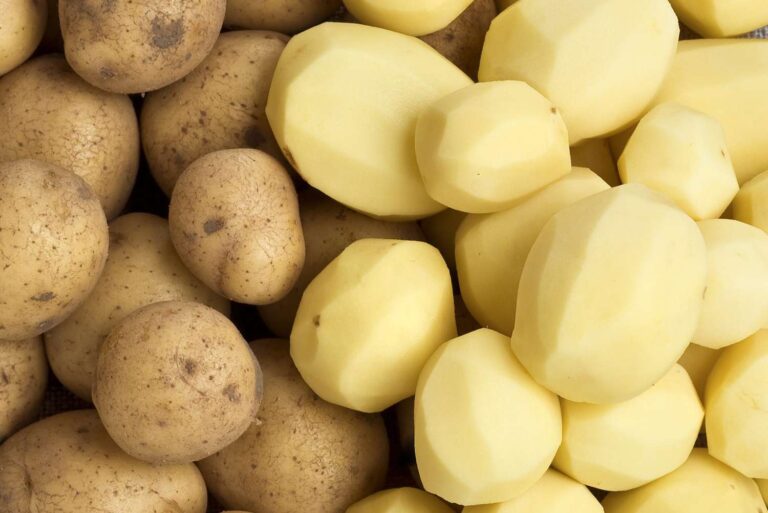Yes, 1-2 Pisces can be consumed, while it is generally not recommended to consume undercooked potatoes due to potential health risks, properly cooked potatoes are a nutritious and delicious part of many diets.
Moreover, boiling, baking, or frying potatoes until they are fully done ensures the elimination of natural toxins, making them safe to eat. Enjoying fully cooked potato dishes like mashed potatoes, baked potatoes, or fries provides a tasty and satisfying way to include this versatile vegetable. Always prioritize thorough cooking to enhance both the flavor and safety of your potato dishes.
Raw Potato Nutrition Facts

| Nutrient | Amount per 100 grams of Raw Potatoes |
| Energy | 77 calories |
| Total Lipid (Fat) | 0.09 grams |
| Protein | 1.05 grams |
| Carbohydrates | 17.5 grams |
| Starch | 15.3 grams |
| Fiber | 2.1 grams |
| Calcium | 12 milligrams |
| Iron | 0.81 milligrams |
| Magnesium | 23 milligrams |
| Phosphorus | 57 milligrams |
| Potassium | 425 milligrams |
| Sodium | 6 milligrams |
| Zinc | 0.3 milligrams |
| Copper | 0.11 milligrams |
| Manganese | 0.153 milligrams |
| Selenium | 0.4 micrograms |
| Vitamin C | 19.7 milligrams |
| Thiamin (Vitamin B1) | 0.081 milligrams |
| Riboflavin (Vitamin B2) | 0.032 milligrams |
| Niacin (Vitamin B3) | 1.06 milligrams |
| Pantothenic Acid (Vitamin B5) | 0.295 milligrams |
| Vitamin B6 | 0.298 milligrams |
| Folate | 15 micrograms |
| Choline | 12.1 milligrams |
| Lutein and Zeaxanthin | 9 micrograms |
| Vitamin E | 0.1 milligrams |
| Vitamin K | 2 micrograms |
What Happens When You Eat a Raw Potato?
- Solanine Poisoning:
- Raw potatoes contain solanine, a natural glycoalkaloid toxin that acts as a natural defense mechanism for the plant.
- Solanine levels are higher in the skin and green parts of the potato.
- Ingesting high amounts of solanine can lead to solanine poisoning, causing symptoms such as nausea, vomiting, abdominal pain, diarrhea, and, in severe cases, neurological symptoms like confusion and headaches.
- Gastrointestinal Discomfort:
- They are harder to digest compared to cooked ones, and consuming them in large quantities may cause gastrointestinal discomfort.
- The starches in raw potatoes are more resistant to digestion, potentially leading to bloating and gas.
- Bacterial Contamination:
- They may harbor harmful bacteria, including E. coli and Salmonella, which can cause foodborne illnesses.
- Bacterial contamination can lead to symptoms such as nausea, vomiting, abdominal cramps, diarrhea, and fever.
- Nutrient Absorption Issues:
- Cooking helps break down certain compounds in potatoes, making their nutrients more bioavailable.
- Consuming raw potatoes may limit the absorption of nutrients due to the presence of enzyme inhibitors and resistant starches.
- Allergic Reactions:
- Some individuals may be allergic to certain proteins in raw potatoes, leading to allergic reactions such as itching, hives, or, in severe cases, anaphylaxis.
- Oxalate Concerns:
- Raw potatoes, especially the skin, contain oxalates. Excessive consumption of oxalates may contribute to the formation of kidney stones in susceptible individuals.
Tips to Ensure Your Potatoes Are Cooked
- Choose Fresh Potatoes:
- Select fresh, firm potatoes without sprouts, green spots, or any signs of decay.
- Wash Thoroughly:
- Wash the potatoes under running water to remove dirt and debris from the skin.
- Peel or Remove Green Parts:
- Peel them or cut away any green parts, as they contain higher levels of the toxic glycoalkaloid, solanine.
- Use Clean Utensils and Surfaces:
- Ensure that cutting boards, knives, and other utensils are clean before preparing potatoes to prevent cross-contamination.
- Cut Uniformly:
- Cut them into uniform pieces to ensure even cooking.
- Cooking Methods:
- Choose appropriate cooking methods based on your recipe and preference, such as boiling, baking, microwaving, or frying.
- Boiling effectively reduces solanine levels and is a good option for mashed potatoes.
- Baking or roasting can enhance the flavor and texture of potatoes.
- Check for Doneness:
- Pierce them with a fork or knife to check for tenderness. If they easily slide off the utensil, they are likely done.
- Use a food thermometer to ensure the internal temperature reaches a safe level (e.g., 210°F or 99°C for baked potatoes).
- Avoid Partial Cooking:
- Ensure that they are fully cooked and avoid partially cooking them, as this can leave behind raw or undercooked portions.
- Consider Microwaving:
- Microwaving potatoes before using other cooking methods can accelerate the cooking process. However, ensure they are cooked through.
- Store Properly:
- Store cooked potatoes in the refrigerator and consume them within a few days to prevent bacterial growth.
- Be Mindful of Allergies:
- If you or others have allergies to certain foods, be cautious with ingredients and potential cross-contamination.
- Follow Recipe Guidelines:
- Adhere to recommended cooking times and temperatures in recipes to ensure proper cooking.
Specific Concerns for Certain Potato Preparations
- Raw Potato Dishes:
- Concern: They contain solanine, a natural toxin that can cause solanine poisoning.
- Safety Tip: Avoid consuming large amounts of raw potatoes. If used in salads, store them in the refrigerator to inhibit bacterial growth.
- Potato Salad:
- Concern: Prepared potato salad may be prone to bacterial contamination, especially if left at room temperature.
- Safety Tip: Keep potato salad refrigerated, and consume it within a few hours. Avoid leaving it at room temperature for an extended period.
- Partially Cooked Potatoes:
- Concern: Partially cooked them may have unevenly cooked portions, leading to potential health risks.
- Safety Tip: Ensure potatoes are fully cooked, especially in dishes like casseroles or gratins. Use a food thermometer to check for doneness.
- Fried Potatoes (French Fries, Potato Chips):
- Concern: High-temperature frying can produce acrylamide, a potential carcinogen, in starchy foods.
- Safety Tip: Fry ones at lower temperatures, blanch them before frying, and avoid overcooking to reduce acrylamide formation.
- Potato Skins:
- Concern: Potato skins may contain higher levels of pesticides if not thoroughly washed.
- Safety Tip: Wash them thoroughly, and consider choosing organic potatoes to reduce pesticide exposure.
- Potato Soup:
- Concern: Cream-based potato soups may spoil if not stored and reheated properly.
- Safety Tip: Refrigerate potato soup promptly and reheat it thoroughly. Avoid leaving cream-based soups at room temperature for extended periods.
- Dehydrated or Instant Potatoes:
- Concern: Some instant potato products may contain added preservatives or flavorings.
- Safety Tip: Check ingredient labels and choose products with minimal additives. Follow recommended cooking instructions.
- Potato Pancakes or Latkes:
- Concern: Shredded potatoes in pancake form may have uneven cooking.
- Safety Tip: Ensure pancakes are cooked thoroughly on both sides and use a food thermometer to confirm the internal temperature.
- Potato Stews and Curries:
- Concern: They in stews may not cook uniformly.
- Safety Tip: Cut them into consistent sizes and ensure they are fully cooked by checking their tenderness.
- Potato Casseroles:
- Concern: Large, layered potato casseroles may have uneven cooking.
- Safety Tip: Cut them into uniform slices, and adjust cooking times to ensure even cooking throughout the casserole.
How to Fix Undercooked Potatoes

To address undercooked potatoes, the most effective method is to continue cooking them using the same cooking technique employed initially. Here are specific steps for common cooking methods:
- Boiled Potatoes:
- Place undercooked boiled potatoes back into boiling water.
- Continue boiling for an additional 10 minutes or until they reach the desired tenderness.
- Maintain a temperature of 212°F or a rolling boil.
- Baked Potatoes:
- Preheat the oven to 450°F for 10 minutes.
- Return undercooked baked potatoes to the oven.
- Continue baking for approximately 15 minutes or until they are fully cooked.
- If the potatoes are already caramelized, adjust the oven rack to a lower level, away from the heat source.
- Check for doneness, and serve the potatoes hot.
FAQ’s
Is it safe to eat raw potatoes?
Raw potatoes can be consumed in small amounts, but cooking is recommended to enhance taste and eliminate potential negative effects on digestion.
Are raw potatoes healthier than cooked ones?
Raw potatoes may have higher vitamin C content, but cooking increases potassium, magnesium, and vitamin B6. Both raw and cooked forms offer nutritional benefits.
What is the toxicity of raw potatoes?
The toxin solanine in raw potatoes varies, and a toxic dose is approximately 1 milligram or more per kilogram of body weight. Proper cooking reduces solanine levels.
Can you eat raw sweet potatoes?
Sweet potatoes can be eaten raw, but cooking enhances digestibility and reveals additional nutrients. Unlike regular potatoes, sweet potatoes don’t contain solanine.
Can you freeze raw potatoes?
Freezing raw potatoes may result in a mushy texture. It’s recommended to cook or partially cook them before freezing to improve texture and reduce moisture.
Are undercooked potatoes the same as raw potatoes?
Undercooked potatoes have partially cooked portions, making them different from fully raw potatoes. While safer than raw, undercooked potatoes may lack optimal taste.
Do undercooked potatoes taste off?
Yes, undercooked potatoes and raw potatoes taste different due to their crunchier texture and bitter flavor. Proper cooking improves taste by breaking down starches.
Can undercooked potatoes upset your digestive system?
Yes, undercooked potatoes may upset the digestive system as raw starch is challenging to digest. It can lead to issues such as constipation, bloating, gas, and cramps.
Do undercooked potatoes have toxic compounds?
Yes, undercooked or raw potatoes contain toxic glycoalkaloids. These compounds can cause digestive issues, drowsiness, vomiting, and, in severe cases, serious health issues.
What happens if you consume undercooked potatoes that haven’t been peeled?
Consuming undercooked potatoes, especially with skin, can lead to solanine poisoning. Proper cooking and peeling reduce the risk of toxic compound ingestion and potential health issues.
How can you tell if potatoes have been undercooked?
Skewer the potato with a fork; if it passes smoothly, the potato is cooked. Resistance indicates undercooking. Avoid using a knife for this test.
How to save undercooked potatoes?
To save undercooked potatoes, add milk or cream and cook over low heat until soft. Alternatively, boil for 12-15 minutes or use a microwave, ensuring they are hot from the initial cooking.
Final Words
It is not advisable to eat undercooked potatoes. The presence of natural toxins, such as solanine, in raw or undercooked potatoes can lead to health risks, including digestive issues and, in extreme cases, solanine poisoning. Properly cooking them through boiling, baking, or frying is essential to eliminate these risks.
Furthermore, if undercooked them are encountered, returning them to the heat source is recommended and continuing cooking until they are thoroughly done. Prioritizing proper cooking practices ensures the safe consumption of potatoes and minimizes the potential health hazards associated with undercooked varieties.

